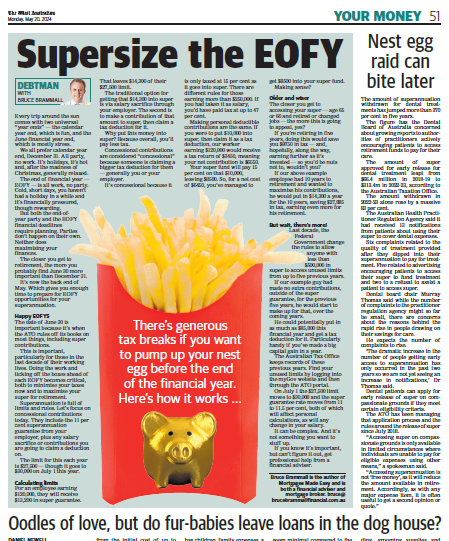Debt Man column – The West Australian (Money)

Bruce Brammall, The West Australian, 20 May 2024
Every trip around the sun comes with two universal “year ends”.
The calendar year end, which is fun. And the June financial year end, which is mostly stress.
We all prefer calendar year end, December 31. All party, no work. It’s holidays, it’s hot and, after the busyness of Christmas, generally relaxed.
The end of financial year (EOFY) is all work, no party. Cold, short days, you haven’t had a holiday in a while and it’s financially pressured, though rewarding.
But both the end of year party and the EOFY financial deadlines require planning. Parties don’t happen on their own. Neither does maximising your finances.
The closer you get to retirement, the more you probably find 30 June more important than 31 December.
It’s now the back end of May. Which gives you enough time to prepare for EOFY opportunities for your superannuation.
Happy EOFYS
The date of 30 June is important because it’s when the ATO rules off its books on most things, including super contributions.
This is important, particularly for those in the last decade of their working lives. Doing the work and ticking off the boxes ahead of each EOFY becomes critical, both to minimise your taxes now and to maximise your super for retirement.
Superannuation is full of limits and rules. Let’s focus on “concessional contributions” (CCs) today.
CCs include the 11 per cent Superannuation Guarantee from your employer, plus any salary sacrifice or contributions you are going to claim a deduction on.
The limit for this, each year, is $27,500. (Though it goes to $30,000 on 1 July this year.)
Calculating limits
For an employee earning $120,000, they will receive $13,200 in SG. That leaves $14,300 of their $27,500 limit.
The traditional option for getting that $14,300 into super is via salary sacrifice, via your employer. The second is to make a contribution of that amount to super, then claiming a tax deduction for it.
Why put this money into super? Because overall, you’ll pay less tax.
CCs are considered “concessional” because someone is claiming a bigger tax deduction for them – generally you or your employer.
It’s concessional, because it is only taxed at 15 per cent as it goes into super. (There are different rules for those earning more than $250,000.) If you had taken it as salary, you’d have paid tax at up to 47 per cent.
Making personal deductible contributions are the same. If you were to put $10,000 into super, then claim it as a tax deduction, our worker earning $120,000 would receive a tax return of $3450, meaning your net contribuxtion is $6550.
Your super fund will pay 15 per cent on that $10,000, leaving $8500.
So, for a net cost of $6450, you’ve managed to get $8500 into your super fund.
Making sense?
Older and wiser
The closer you get to accessing your super (age 65 or 60 and retired or changed jobs), the more this is going to appeal, yes?
If you’re retiring in five years and doing this would save you $9750 in tax (and, hopefully, along the way, earning further as it’s invested), you’d be nuts not to, wouldn’t you?
If our above example employee had 10 years to retirement and wanted to maximise his contributions, he would put in $14,300 a year for the 10 years, saving $27,885 in tax, earning even more for his retirement.
But wait, there’s more!
Last decade, the Government change the rules to allow anyone with less than $500,000 in super to access unused limits from up to five previous years.
If our example guy had done no extra contributions, outside SG, for the previous five years, he would start to make up for that, over the coming years.
He could potentially put in as much as $85,800 this financial year and get a tax deduction for it. Particularly handy if you’ve made a big capital gain in a year.
The ATO keeps records of these previous years. Find your unused limits by loggin into the mygov website and then through the ATO portal.
On 1 July, the $27,500 limit moves to $30,000 and the SG rate moves from 11 to 11.5 per cent, both of which will affect personal calculations, as will any change in your salary.
It can be complex. And it’s not something you want to stuff. If you know it’s important, but can’t figure it out, get professional help from a financial adviser.
Bruce Brammall is the author of Mortgages Made Easy and is both a financial adviser and mortgage broker. E: bruce@brucebrammallfinancial.com.au.